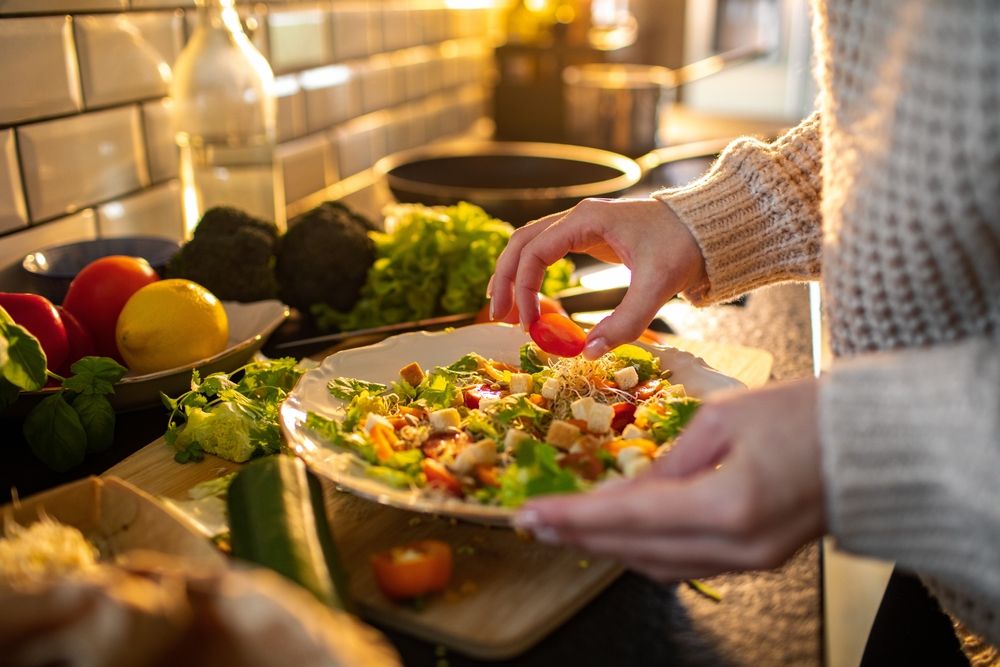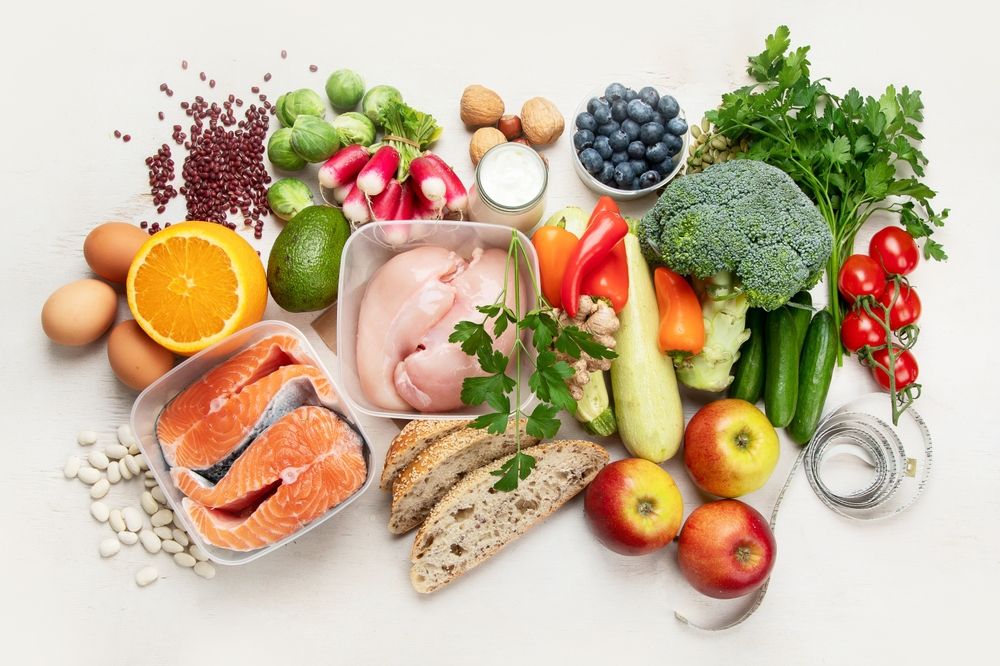
While low-calorie diets may promise rapid weight loss, they often leave you feeling irritable, low on energy, and lacking in essential nutrients. A more sustainable option for many is a 2,000-calorie meal plan, which can provide the nutrients you need while supporting safe, long-term weight loss goals.
You may have noticed that nutrition labels on packaged foods base their daily recommended values on a 2,000-calorie diet. While not everyone needs exactly 2,000 calories per day, this amount is a general guideline that works for many adults to maintain a healthy weight. Adjustments can be made depending on individual needs.
Read on to discover if a 2,000-calorie meal plan aligns with your weight loss goals, and get a sample day of meals, complete with recipes, to help you get started.
Who is a 2,000-Calorie Meal Plan Suitable For?
Your exact calorie needs depend on various factors like your current weight, gender, activity level, and age. To give you a starting point, the Dietary Guidelines for Americans provide average calorie ranges based on age and gender:
- Adults aged 31 to 59: Most women need 1,600 to 2,200 calories per day, while men typically require 2,200 to 3,000 calories.
- Younger adults aged 19 to 30: Women need 1,800 to 2,400 calories daily, and men require 2,200 to 3,000 calories.
This means that a 2,000-calorie diet may work for many men and women, though individual calorie needs may vary based on your unique situation and activity level.
How to Determine a Safe Calorie Deficit for Weight Loss
To lose weight, you need to create a calorie deficit—burning more calories than you consume. This can be achieved by eating fewer calories, increasing physical activity, or a combination of both.
Research suggests that for most people, reducing calorie intake (or combining reduced intake with increased physical activity) by 300 to 600 calories per day can lead to a weight loss of about 0.5 to 1 pound per week.
When determining your calorie deficit, consider the recommended calorie ranges from the Dietary Guidelines for Americans. Consuming too few calories can make it difficult to meet your nutrient needs, so it’s important to find a balance. If you’re unsure about the best approach, consult a registered dietitian or physician to create a safe and sustainable weight loss plan.
Sample 2,000-Calorie Meal Plan
Here’s a day of meals to get you started on a 2,000-calorie plan:
- Breakfast (489 calories): Easy Turkey-Sweet Potato Breakfast Hash (422 calories) with one sliced peach (67 calories)
- Morning Snack (183 calories): Chocolate Coconut Banana Smoothie
- Lunch (517 calories): Veggie Tuna Melt (347 calories), Butternut Squash Soup (150 calories), and baby carrots (20 calories)
- Afternoon Snack (225 calories): Non-fat Greek yogurt (5 oz) with raspberries (½ cup) and chopped walnuts (½ oz)
- Dinner (586 calories): Butter-Baked Salmon and Asparagus
This balanced plan provides nutritious meals that help you stay on track with your weight loss goals while ensuring you get the nutrients your body needs.
Breakfast
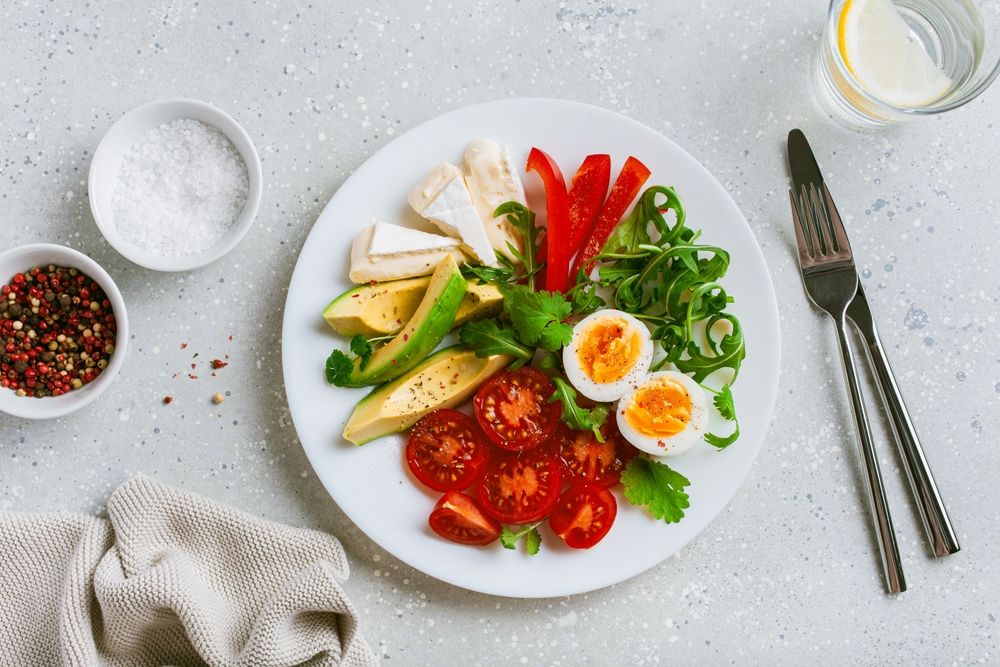
Aim for a breakfast in the range of 400 to 500 calories.
Sample Breakfast:
- Easy Turkey-Sweet Potato Breakfast Hash (422 calories)
- One peach, sliced (67 calories)
This 489-calorie breakfast fits perfectly into a 2,000-calorie diet, offering a combination of protein and fiber to help keep you full and satisfied. The dish includes sautéed sweet potatoes and green bell peppers mixed with turkey sausage and eggs, delivering 26 grams of protein along with a balanced mix of healthy fats and complex carbs.
A sliced peach adds a refreshing, naturally sweet finish, providing 2 grams of fiber and 13% of your daily vitamin C needs.
Other Breakfast Ideas:
- Healthier Denver Omelet with 1 slice of sourdough toast (468 calories)
- Oatmeal with Peanut Butter and Banana plus two chicken sausage links (480 calories)
- Scrambled Eggs with Salmon, Asparagus, and Goat Cheese plus a banana (433 calories)
Morning Snack
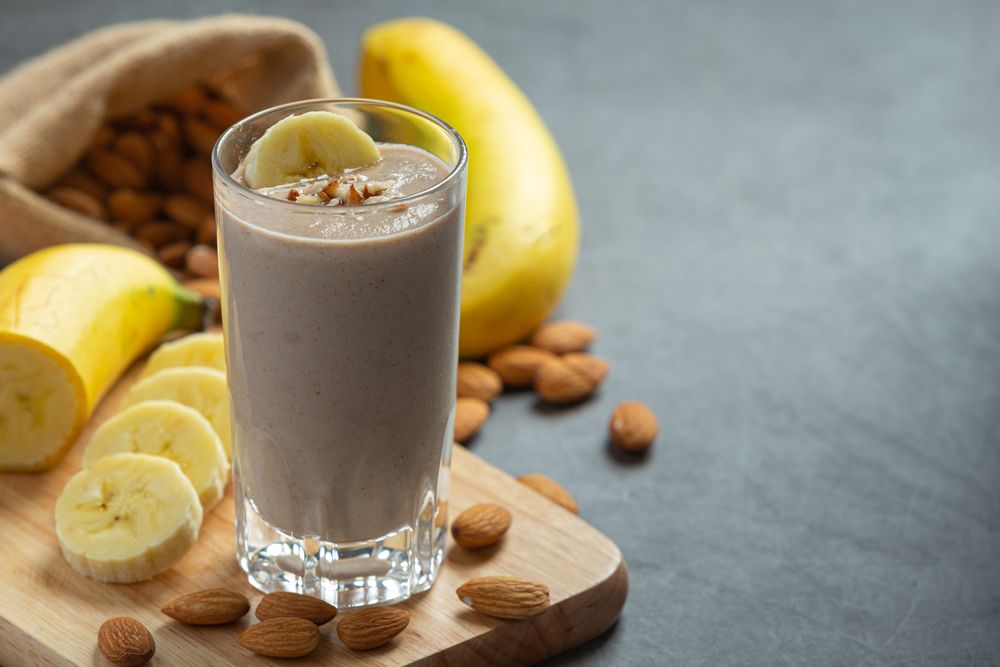
Aim for a snack between 150 and 250 calories.
Sample Snack:
Chocolate Coconut Banana Smoothie (183 calories)
Smoothies make for a quick and satisfying mid-morning snack that can help curb hunger while boosting your daily nutrient intake. This chocolate coconut banana smoothie is under 200 calories and feels like a dessert, but it’s packed with benefits: probiotics and protein from Greek yogurt, along with fiber and potassium from the banana.
Lunch
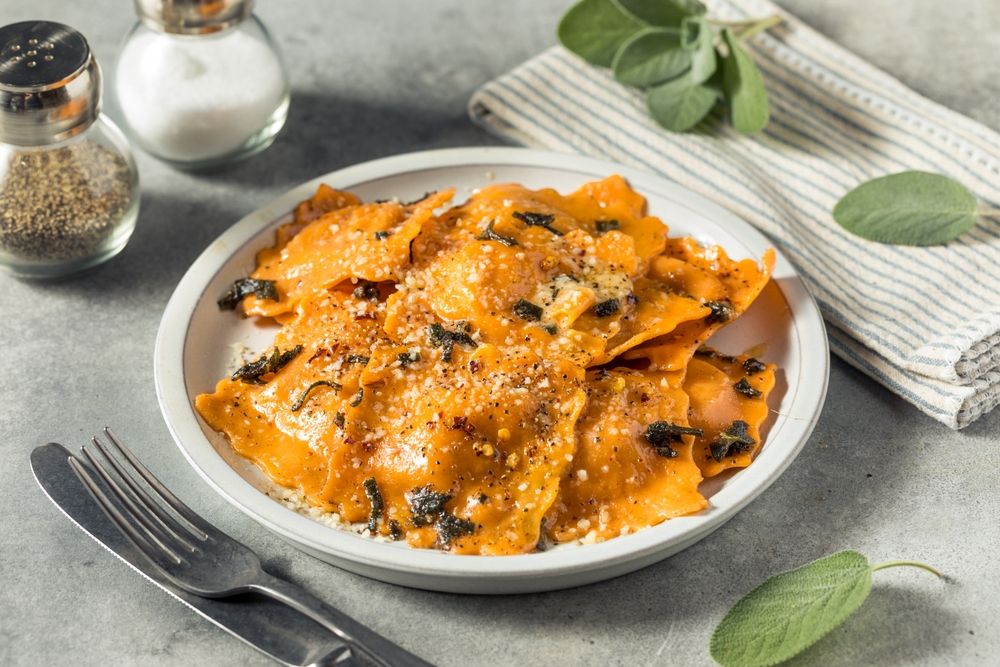
Aim for a lunch between 450 and 550 calories.
Sample Lunch:
- Veggie Tuna Melt (347 calories)
- Butternut Squash Soup (150 calories)
- 2 ounces baby carrots (20 calories)
This veggie-packed tuna melt gives the traditional tuna sandwich a healthy twist by adding chickpeas, peppers, onion, and celery, and replacing the mayonnaise with Greek yogurt and Dijon mustard. Paired with butternut squash soup and baby carrots, this filling and nutrient-rich meal totals 517 calories. It’s also an excellent source of vitamins A and C and provides fiber from both the squash and chickpeas.
If you’re on the go or pressed for time, you can batch-cook the tuna salad and soup over the weekend for easy lunches throughout the week.
Other Lunch Ideas:
- Veggie and Chicken Loaded Calzone with a glass of 1% milk (501 calories)
- Caprese Sandwich with Baked French Fries (490 calories)
- Grilled Caesar Salad with a cup of grapes (472 calories)
Afternoon Snack
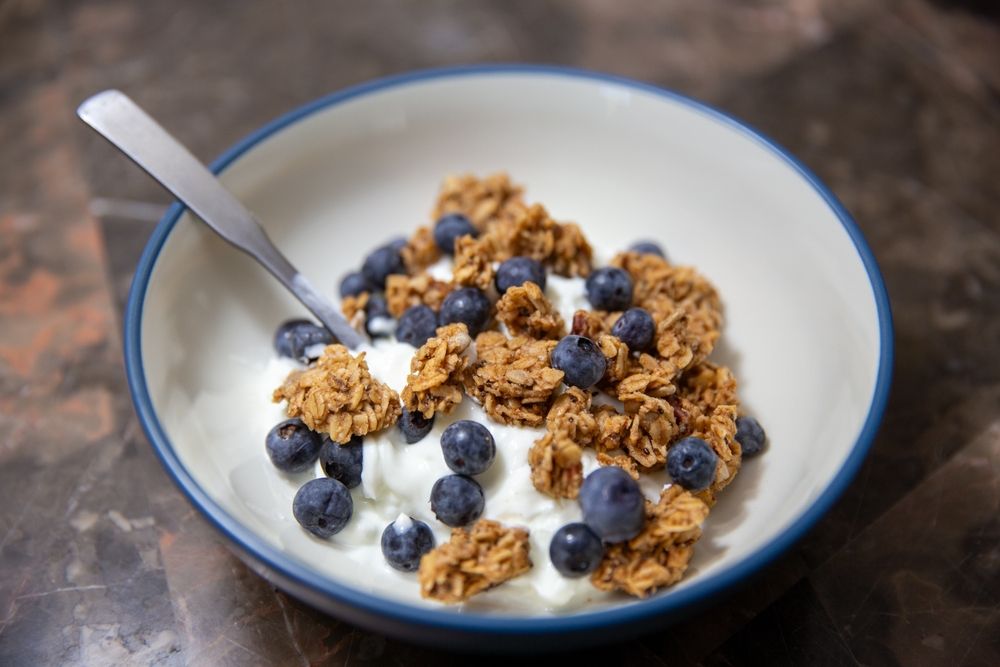
Use this snack to round out your day, aiming for 150 to 300 calories to help you meet your daily goals.
Sample Snack:
5-ounce container of non-fat Greek yogurt with ½ cup of raspberries and ½ ounce of chopped walnuts (225 calories)
This yogurt parfait makes a perfect afternoon snack, keeping you energized until dinner while helping you meet your daily calorie, protein, and fiber goals. Greek yogurt is high in protein and probiotics, while raspberries provide a fiber-rich fruit option. Topping it off with chopped walnuts adds a boost of omega-3 fatty acids and a satisfying crunch!
Dinner
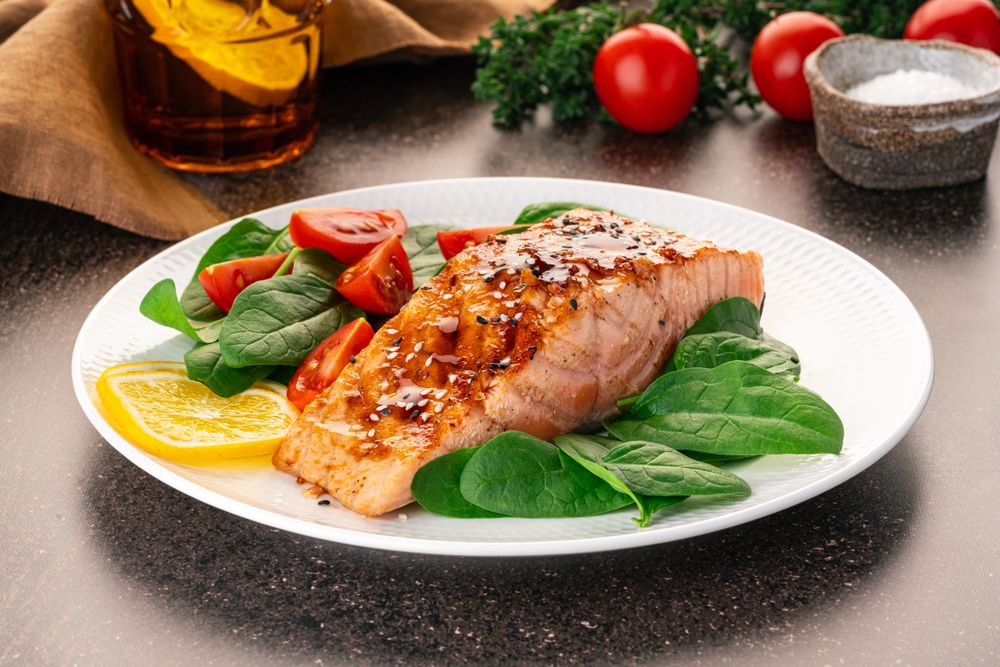
Aim for a dinner between 500 and 600 calories.
Sample Dinner:
Butter-Baked Salmon and Asparagus (586 calories)
Finish your 2,000-calorie day with this easy butter-baked salmon and asparagus sheet pan meal. While this dish is higher in fat, it’s packed with omega-3 fatty acids like DHA and EPA, which are known to help reduce inflammation, improve cholesterol levels, lower blood pressure, and support insulin sensitivity. The healthy fats in this meal also provide lasting satiety, helping you avoid late-night snacking.
Other Dinner Ideas:
- Honey-Mustard Glazed Salmon with Roasted Asparagus and Crispy Rosemary Potatoes (520 calories)
- Grilled Flank Steak with Chimichurri and a Warm Corn Tortilla (500 calories)
- Herb Roast Chicken with Root Vegetables and Parmesan Roasted Broccoli (520 calories)
Total Calories: 2,000
(489 breakfast + 183 snack + 517 lunch + 225 snack + 586 dinner)
Final Thoughts
A 2,000-calorie diet can support weight maintenance or weight loss, but it's essential to understand your individual calorie needs to reach your goals. This sample 2,000-calorie meal plan provides a balanced, nutrient-dense day with three meals and two snacks. For personalized advice, consult a physician or dietitian to create a healthy and sustainable weight loss plan tailored to your needs.

